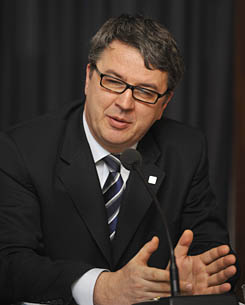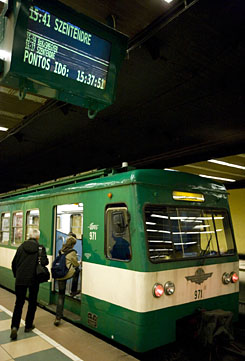Newest hearings in the Hagyó case
The BKV
case continued with the hearing of two defendants on the Kecskemét Court. H.
Iván, Hagyó’s former lawyer and B. Tünde, who is a CEO in one of the company
who they had contract with denied their guiltiness. B. Tünde was charged with misappropriation
as a privy (assistant/auxiliary in a crime) and with forgery in the case of the
copier at the Optimismo Ltd.
In an
earlier hearing Antal Attila in this one question admitted his guiltiness.
According to the former CEO of the BKV they signed a contract without real
achievement with this Ltd., because from the inlet 20 million forints they paid
Aba Botond’s (former CEO of the BKV) severance payment. Antal Attila verified
this achievement. According to the statement of B. Tünde (CEO of Optimismo) she
didn’t assisted in the review of the BKV copiers, another person made the
actual work and she even gave the money to that person.
(Source: origo.hu)
H. Iván
defendant didn’t make another testimony, he maintained his instigation
testimony. He objected that the indictment is pen/define in general, whereat
it’s impossible to respond. He said it too that they accuse him with crimes
what happened at times when he was abroad. He approved this with passport.
Original:
Újabb meghallgatások a Hagyó-perben
Két vádlott meghallgatásával folytatódott a BKV-per
tárgyalása a Kecskeméti Törvényszéken. H. Iván, Hagyó egykori ügyvédje és B. Tünde,
egy szerződő cég ügyvezetője is tagadta bűnösségét. B. Tünde bűnsegédként
elkövetett hűtlen kezeléssel és magánokirat-hamisítással vádolják az Optimismo
Kft. nagy port kavart fénymásoló-ügyében.
Egy korábbi tárgyaláson ebben az egy kérdésben a fővádlottak
közül Antal Attila elismerte bűnösségét. Az egykori BKV-vezér a nyomozás adatai
szerint azért kötött valódi teljesítés nélküli szerződést a kft-vel, hogy a
befolyó 20 millió forintból elődje, Aba Botond végkielégítését kifizessék. A
teljesítést Antal Attila igazolta. B. Tünde, az Optimismo ügyvezetője állítása
szerint nem vett részt a BKV-fénymásolók felülvizsgálatában, a tényleges munkát
egy másik személy végezte el, a pénzt is neki adta át.
(Forrás: origo.hu)
H. Iván vádlott nem tett új vallomást, nyomozati vallomásait
fenntartotta. Kifogásolta, hogy a vádirat általánosságokban fogalmaz, melyekre
lehetetlen reagálni. Jelezte azt is, hogy olyan időpontban elkövetett
bűncselekménnyel is megvádolták, amelynek vélt elkövetésekor külföldön
tartózkodott. Ezt útlevelével bizonyította is.
A tárgyalás végén Balogh Zsolt fotókat adott át a
bíróságnak, amelyek bizonyítják, a szentendrei HÉV utastájékoztató-rendszere a
mai napig rendben üzemel.


















